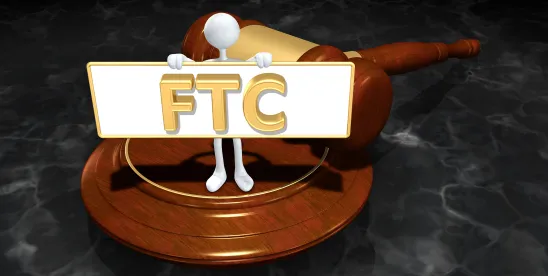December has been a busy and banner month for the Federal Trade Commission (FTC). Following its successful suit to block the proposed Kroger-Albertsons merger, the FTC issued two significant announcements: (1) the withdrawal of the long-standing Antitrust Guidelines for Collaborations Among Competitors (Collaboration Guidelines)1 and (2) the first price discrimination lawsuit brought by the agency in nearly twenty-five years.2
Withdrawal of the Collaboration Guidelines
On December 11th, the FTC and the Antitrust Division of the Department of Justice (DOJ, collectively the Antitrust Agencies) withdrew the Collaboration Guidelines, which had been in place since 2000 and provided companies the framework by which they could lawfully work with actual and potential competitors to develop procompetitive products and/or services that they may not have been able to offer by themselves.3 The Commission voted 3-2 in favor of the withdrawal with Commissioner Andrew Ferguson, President-Elect Trump’s nominee to chair the agency, issuing a dissent questioning the timing of the vote and stating that “the time for the Biden-Harris Commission to conduct such guidance review is over.”4 In the Joint Statement, the Antitrust Agencies stated that the Collaboration Guidelines were “outdated” and failed to address advances that regulators utilize to analyze these types of collaborations. Moreover, the Antitrust Agencies also stated that the Collaboration Guidelines do not properly reflect how AI, algorithms, vertical integration, and private equity roll-ups adversely impact competition when such concepts are integral parts of the proposed collaboration.
Takeaways From the Withdrawal
As with prior withdrawals of guidance by the Antitrust Agencies, about which the Polsinelli Antitrust Team has previously alerted,5 the federal government continues to leave the private sector with a significant level of uncertainty, offering no new guidance and referring companies to the Antitrust Agencies’ “case by case” approach to enforcement. The Polsinelli Antitrust Team can help companies navigate the current unpredictability on these important strategic business and legal issues. It remains to be seen what the new proposed composition of the FTC and Gail Slater, the nominee to lead the DOJ Antitrust Division, will do with respect to the guidance that has been withdrawn, and whether they will revisit the 2023 Merger Guidelines or the new Hart-Scott-Rodino form and rules.
Federal Enforcement of Robinson-Patman is Back
In the first time since 2000, the FTC announced on December 12th that it had filed a price discrimination suit against the largest wholesaler of wine and spirits pursuant to Section 2(a) of the Robinson-Patman Act (the RPA). The RPA, which was enacted in 1936, prohibits a supplier from charging competing resellers different prices for commodities of like grade and quality “where the effect of such discrimination may be substantially to lessen competition.” Here, the FTC alleges that the wholesaler provided favorable pricing for certain wines and spirits to large customers while charging smaller customers a higher price for the same products, with no opportunity to obtain similar pricing or other justifications. This action represents another promise that the Biden Administration kept with regard to increasing antitrust enforcement, including the revival of the RPA, as noted in our January 2023 publication alerting clients to this investigation.6
Takeaways from RPA Enforcement
Mark Meador, who has been nominated as an FTC Commissioner, is on record as favoring enforcement of the RPA.7 With Meador and Commissioners Bedoya and Slaughter in support of RPA enforcement, we should expect more enforcement activity in this area. There has also been at least one recent plaintiff’s verdict in a private RPA suit in California, which also suggests that price discrimination risk will not go away. All of this means that clients need to keep price discrimination risk in mind.
[2] https://www.ftc.gov/system/files/ftc_gov/pdf/001-REDACTED-Complaint.pdf
[3] Justice Department and Federal Trade Commission Withdraw Guidelines for Collaboration Among Competitors, December 11, 2024, available at: https://www.ftc.gov/system/files/ftc_gov/pdf/v250000collaborationguidelineswithdrawalstatement.pdf (“Joint Statement”).
[4] Dissenting Statement of Commissioner Andrew N. Ferguson Regarding the Withdrawal of the Antitrust Guidelines for Collaborations Among Competitors Matter Number V250000, December 11, 2024, available at https://www.ftc.gov/system/files/ftc_gov/pdf/collaborations-guidance-withdrawal-ferguson_-statement.pdf.
[5] Polsinelli Insight, “No More Safety Net: The Justice Department Withdraws Key Antitrust Guidance for the Healthcare Industry,” February 16, 2023, available at: https://natlawreview.com/article/no-more-safety-net-justice-department-withdraws-key-antitrust-guidance-healthcare
[6] Polsinelli Insight, “What’s Old Is New Again: Reviving ‘Fairness’ With Renewed FTC Price Discrimination Enforcement And What That Means For Companies,” January 18, 2023, available at: https://natlawreview.com/article/what-s-old-new-again-reviving-fairness-renewed-ftc-price-discrimination-enforcement
[7] Blog Post, July 9, 2024, “Not Enforcing the Robinson-Patman Act is Lawless and Likely Harms Consumers,” available at: https://fedsoc.org/commentary/fedsoc-blog/not-enforcing-the-robinson-patman-act-is-lawless-and-likely-harms-consumers






 />i
/>i
